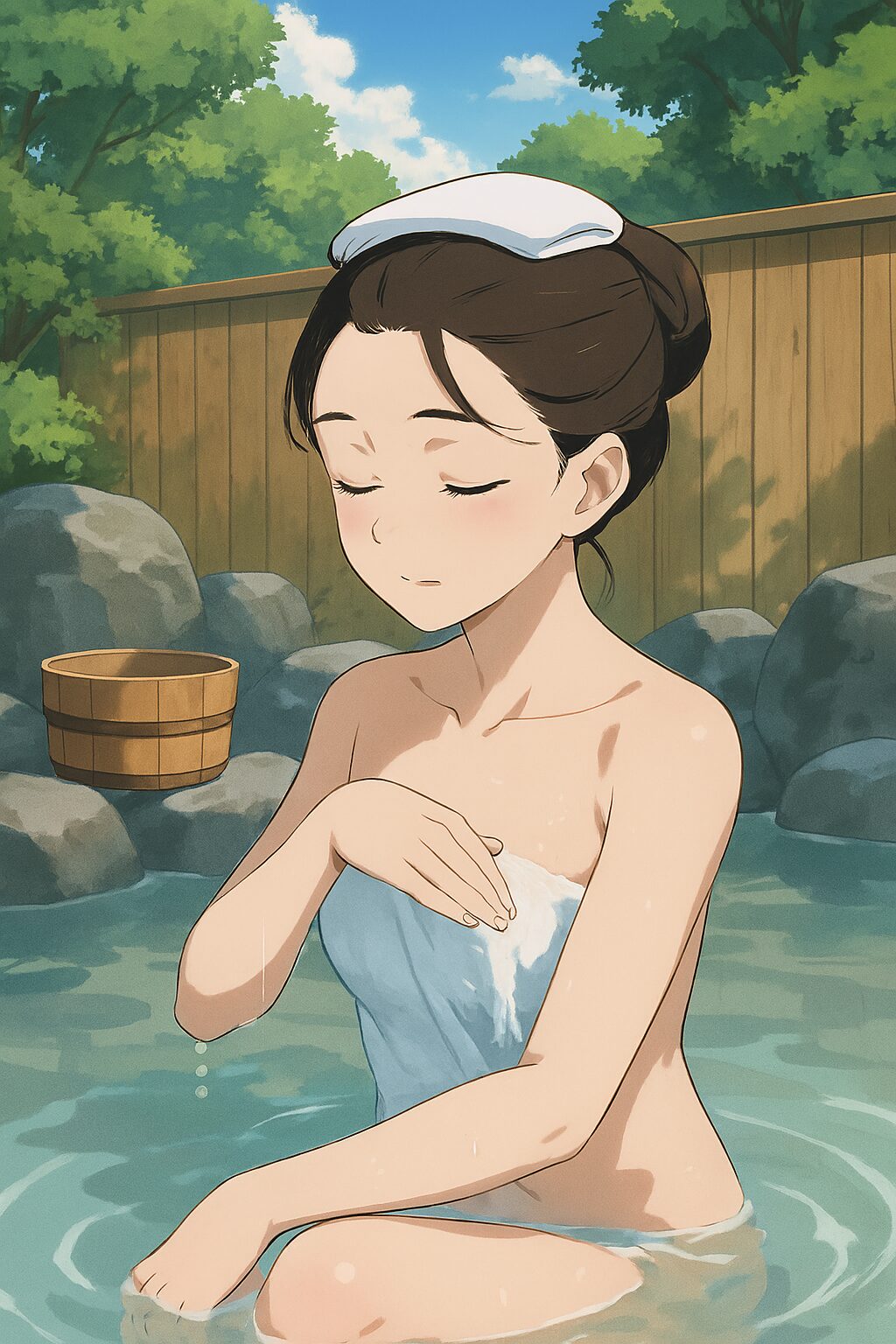Japanese hot springs are more than just a place to relax—they’re a space for purification, connection, and quiet reflection. This article explores the cultural and spiritual significance behind the rituals of bathing in Japan.
- 🧴 Introduction: A Bath Is Never Just a Bath in Japan
- 🛁 Why Do You Wash Before Entering the Bath?
- 🧍♂️ Why Is Everyone Naked? — The Symbolism of Vulnerability
- 🧘♀️ Why Is Silence Valued in the Bath?
- 🔗 Learn More About Japan’s Bathing Traditions
- 🪷 Bathing Rituals as Acts of Mindfulness
- 🌍 For International Visitors: The Onsen Is a Cultural Gateway
- 📚 Explore More in the “Why Japan” Series
- ✨ Conclusion: Bathing as a Way to Reset
- 🧴 はじめに:温泉はただの入浴ではない
- 🛁 なぜ温泉に入る前に「かけ湯」をするのか?
- 🧍♂️ なぜ裸で入るのか?—平等と無防備の象徴
- 🧘♀️ 湯船では静かに—沈黙の美学
- 🔗 湯文化をもっと知る:季節と心をつなぐ風習
- 🪷 湯の作法は“心の所作”だった
- 🌍 海外の読者へ:温泉は日本文化の縮図
- 📚 シリーズをもっと読む
- ✨ まとめ:湯に浸かるということは、自分を整えること
🧴 Introduction: A Bath Is Never Just a Bath in Japan
For many international visitors, Japanese hot springs—or onsen—can be both enchanting and puzzling.
Why do people wash before entering the bath? Why is everyone naked? Why is silence so important?
These aren’t just rules—they’re reflections of a deeper cultural philosophy.
In Japan, bathing is not merely about hygiene or relaxation. It’s a ritual of purification, humility, and connection.
In this article, we’ll explore the meaning behind these customs and discover how stepping into an onsen is like stepping into the heart of Japanese culture.
🛁 Why Do You Wash Before Entering the Bath?
Before entering a Japanese hot spring, it’s customary to rinse your body with warm water—known as kakeyu.
While it may seem like a simple hygiene practice, it carries spiritual and cultural significance.
🔹 Purification in Shinto Tradition
In Shinto, Japan’s indigenous spirituality, cleansing is essential.
Kakeyu is a way to wash away physical and spiritual impurities before entering a sacred space—the bath.
It’s not just about being clean. It’s about being ready.
🔹 Greeting the Water
Pouring water over yourself is like saying “hello” to the bath.
It’s a moment of pause, a gesture of respect toward nature and the healing power of hot springs.
🧍♂️ Why Is Everyone Naked? — The Symbolism of Vulnerability
One of the most surprising aspects of Japanese bathing culture is that everyone enters the bath completely naked.
But this isn’t just about comfort—it’s about equality and trust.
🔹 Naked Communion
In Japan, there’s a phrase: hadaka no tsukiai—“naked companionship.”
By removing clothes, you also remove social status, titles, and barriers.
You meet others as equals, human to human.
🔹 Trust Through Vulnerability
Being naked is being vulnerable.
It’s a sign of trust, of openness, and of shared humanity.
The bath becomes a space of emotional intimacy, even among strangers.
🧘♀️ Why Is Silence Valued in the Bath?
Japanese hot springs are often quiet, serene places.
Loud voices and splashing are discouraged—not because of strict rules, but because of cultural sensitivity.
🔹 Listening to the Water
The sound of flowing water, rustling leaves, and soft footsteps—these are part of the experience.
Silence allows you to tune into your senses, to feel the moment fully.
🔹 Unspoken Connection
In the quiet, something beautiful happens.
You begin to feel connected—not through words, but through presence.
It’s a form of silent empathy, a shared peace.
🔗 Learn More About Japan’s Bathing Traditions
Japan’s bathing culture is deeply tied to the seasons, emotions, and spiritual practices.
From summer bath festivals to ancient healing retreats, the hot spring is a place of timeless meaning.
👉 Discover the spirit of Japanese bath culture and seasonal traditions
🪷 Bathing Rituals as Acts of Mindfulness
These customs—washing, undressing, staying quiet—are not just etiquette.
They are acts of mindfulness, ways to prepare your body and soul.
- Kakeyu purifies your outer and inner self
- Nudity invites honesty and humility
- Silence creates space for reflection
Together, they transform bathing into a spiritual practice.
🌍 For International Visitors: The Onsen Is a Cultural Gateway
If you ever visit Japan, don’t just dip into a hot spring—immerse yourself in the experience.
Understanding the rituals will deepen your appreciation and turn a simple bath into a profound cultural moment.
The onsen is a mirror of Japanese values:
Harmony with nature, respect for others, and the beauty of quiet presence.
📚 Explore More in the “Why Japan” Series
Curious about the deeper meanings behind Japanese traditions?
This blog series explores the “why” behind everyday customs—from red torii gates to tatami mats.
👉 Browse the full “Why Japan” series here
✨ Conclusion: Bathing as a Way to Reset
In Japan, bathing is more than cleansing—it’s renewal.
It’s a way to reset your body, calm your mind, and reconnect with the world around you.
Next time you enter an onsen, remember:
You’re not just stepping into hot water.
You’re stepping into a centuries-old tradition of healing, humility, and harmony.
なぜ日本の温泉には作法があるのか?湯の文化に宿る心と身体の浄化の意味
日本の温泉には、ただの入浴を超えた「作法」があります。かけ湯、裸の付き合い、静けさ——それらはすべて、心と身体を整えるための儀式。この記事では、温泉文化に込められた深い意味を紐解きます。
🧴 はじめに:温泉はただの入浴ではない
日本を訪れた外国人旅行者が驚くことのひとつに、「温泉の作法」があります。
湯船に入る前に体を洗う、かけ湯をする、裸で入る、静かに過ごす——これらの行動は、単なるマナーではなく、日本人の精神性と文化的価値観が凝縮された「所作」なのです。
この記事では、温泉にまつわる作法の意味を、歴史・宗教・感情の観点から紐解きながら、湯に入るという行為がいかに深い文化体験であるかを探っていきます。
🛁 なぜ温泉に入る前に「かけ湯」をするのか?
温泉に入る前に、湯をすくって体にかける「かけ湯」。
これは衛生面の配慮だけでなく、心身を清める儀式としての意味があります。
🔹 神道的な「穢れを落とす」思想
日本の伝統宗教である神道では、「穢れ(けがれ)」を落とすことが重要視されます。
かけ湯は、外から持ち込んだ穢れを落とし、神聖な湯に入る準備として行われるのです。
🔹 湯との対話の始まり
かけ湯は、湯との最初の接触。
「こんにちは」と挨拶するように、湯に敬意を示す行為でもあります。
この所作には、自然との調和を大切にする日本人の感性が表れています。
🧍♂️ なぜ裸で入るのか?—平等と無防備の象徴
日本の温泉では、基本的に全員が裸で入浴します。
これは単なる習慣ではなく、深い精神性と社会的意味を持っています。
🔹 裸の付き合い=心の距離を縮める
服を脱ぐことは、社会的な肩書きや立場を脱ぐこと。
裸で向き合うことで、人と人との間に壁がなくなり、心の距離が縮まるのです。
🔹 無防備であることの信頼
裸でいることは、無防備であること。
それは、相手を信頼している証でもあります。
温泉は、信頼と安心の空間なのです。
🧘♀️ 湯船では静かに—沈黙の美学
温泉では、騒がず静かに過ごすのが基本。
これは、他者への配慮と空間の美を尊ぶ日本文化の表れです。
🔹 湯の音を味わう
湯が流れる音、風の音、木々のざわめき——
それらを感じることで、五感が研ぎ澄まされ、心が整います。
🔹 無言の交流
言葉を交わさずとも、隣にいる人と心が通じる。
温泉は、沈黙の中にある優しさとつながりを感じる場所でもあります。
🔗 湯文化をもっと知る:季節と心をつなぐ風習
日本には、季節ごとに湯にまつわる風習があります。
たとえば、夏の「お風呂の日」や、古くから続く湯治文化など。
湯は、季節の移ろいとともに、心と身体を整える自然との対話でもあるのです。
🪷 湯の作法は“心の所作”だった
温泉の作法は、単なるマナーではありません。
それは、自分自身を整えるための「心の所作」なのです。
- かけ湯で穢れを落とす
- 裸で心を開く
- 静けさの中で自分と向き合う
これらの行為はすべて、湯に入ることで自分をリセットする儀式なのです。
🌍 海外の読者へ:温泉は日本文化の縮図
もしあなたが日本を訪れるなら、ぜひ温泉に入ってみてください。
そして、作法の意味を知ったうえで湯に浸かれば、ただの観光ではなく、深い文化体験になるはずです。
温泉は、日本人の自然観・人間観・精神性が凝縮された空間。
その静けさの中に、言葉を超えた美しさがあります。
📚 シリーズをもっと読む
このブログでは、日本文化の「なぜ?」を探るシリーズを展開しています。
鳥居の赤、畳の呼吸性など、日常に潜む深い意味を解説しています。
✨ まとめ:湯に浸かるということは、自分を整えること
温泉は、ただ体を温める場所ではありません。
それは、心を整え、他者とつながり、自然と調和するための空間です。
次に温泉に入るとき、ぜひ作法の意味を思い出してみてください。
きっと、湯の中で感じるものが変わるはずです。



コメント